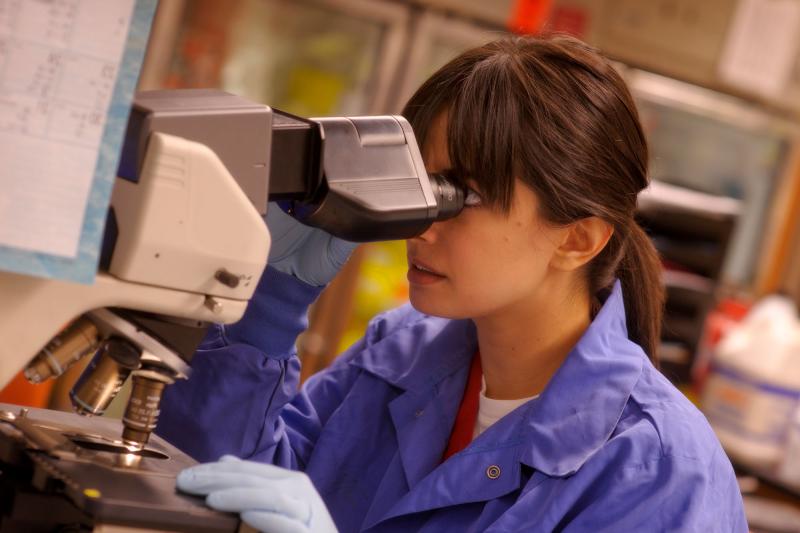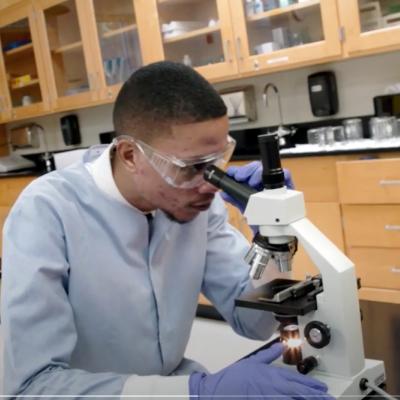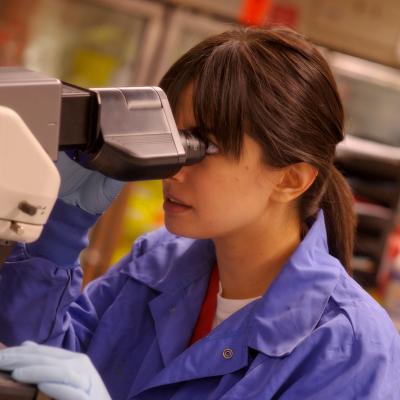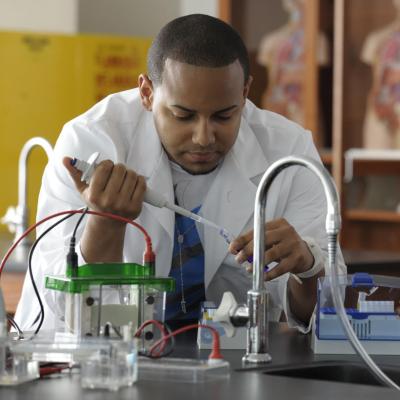- AdventHealth University

Do you see yourself working in a lab alongside other skilled scientists — performing tests, ensuring the quality and accuracy of your results, and finding treatments for diseases? If so, a degree program in laboratory sciences could be the ideal path for you.
But with so many options, deciding which medical or clinical laboratory sciences program is right for your career goals can be overwhelming. You may be wondering, “What is medical laboratory sciences and how does it differ from clinical laboratory sciences?” In this article, we’ll discuss how the two types of lab sciences are just two names for the same occupation. We’ll also help you decide whether this is the right program for you.
What is Medical Laboratory Sciences?
Medical laboratory scientists are detectives. They are given a broad range of biological specimens and tasked with analyzing them and investigating possible issues. They then explain their findings to doctors and patients. Professionals in clinical laboratory sciences should be naturally curious, detail-oriented, and — above all — patient.
Because a major part of their job is discussing complex and often sensitive health information with patients and other professionals, clinical laboratory scientists also need to be excellent communicators — able to condense complicated findings into easily-understood explanations.
With more than 10 billion laboratory tests being performed in the United States each year, medical laboratory sciences researchers are some of the most important and busiest health care professionals working today. Doctors and patients rely on them to deliver life-saving care and to stay informed.
Where Does the Confusion Between Clinical and Medical Laboratory Sciences Originate?
Put simply, the major difference between clinical laboratory sciences and medical laboratory sciences comes down to the title of the job and certification (or at least it did at one time).
The National Credentialing Agency for Laboratory Personnel (NCA) started providing a standardized certification as a clinical laboratory scientist (CLS), whereas the American Society for Clinical Pathology (ASCP) Board of Registry offered certification for medical technologists (MT).
In 2009 — after much confusion among professionals and students deciding between medical and clinical laboratory sciences programs — the two agencies did away with any redundancy and merged to become the ASCP Board of Certification, providing a single certification under the new title of medical laboratory scientist (MLS).
What to Understand About Clinical vs. Medical Laboratory Sciences
So, why is it important to know that medical and clinical laboratory sciences are just two titles for the same role? Mostly, it’s important when you’re looking for a clinical laboratory science program to join and a job after graduation.
Keep in mind that while medical laboratory sciences, medical technology, and clinical laboratory sciences are the same, a medical technician does not fall under these titles. Generally, a medical technician performs less complex tests and requires less education than medical or clinical laboratory sciences researchers.
Additionally, there still isn’t consensus throughout the professional health care community about the conglomeration of these titles under the name of medical laboratory sciences. This means that some schools offer a medical laboratory sciences program, while others may offer a clinical laboratory sciences program, and yet others may offer medical technologist programs. Remember that the education in these programs is the same, just with different titles. So, when you’re searching for programs and schools, make sure to look for any of these three titles to ensure you don’t miss out on a great program just because it uses a different title from what you searched for.
The same goes for searching for a job. Some hospitals seek clinical laboratory scientists. Others place ads for medical laboratory scientists or medical technologists. Make sure to look up any of the three titles when entering the job market.
Education for Clinical Laboratory Sciences
You may now be wondering, “What is medical laboratory sciences education like?” Medical laboratory scientists need to earn at least a Bachelor of Science to work in a lab setting. Medical or clinical laboratory sciences programs will prepare you to fulfill the expectations for competencies, ethics, and professionalism outlined by the American Society for Clinical Laboratory Science.
Your medical or clinical laboratory sciences program curriculum should cover topics such as clinical microscopy, hematology, immunology, laboratory research methods, and the ethics of allied health roles. The program will be designed to prepare you to sit for the national certification examination and to excel in a laboratory setting. Most employers require medical laboratory sciences professionals to hold certification through an accrediting body like the ASCP.
Launch Your Medical Laboratory Sciences Career at AdventHealth University
Now that you have a better understanding of clinical and medical laboratory sciences, the next step on your journey is finding an undergraduate program to gain expertise and prepare for a rewarding career.
The Bachelor of Science in Medical Laboratory Sciences program at AdventHealth University combines theoretical knowledge with practical hands-on education to help you pass the national certification exam sooner and begin helping others understand their health and live healthier lives.
You’ll learn from highly respected medical laboratory sciences faculty mentors who bring their years of professional and educational experience into the classroom to prepare you for the daily rewards and challenges of this field.
Thanks to small class and lab sizes, you’ll also have many opportunities to collaborate with your peers on projects and research — helping you gain essential team skills while you build a solid personal and professional network.
AHU is accredited by the Southern Association of Colleges and Schools Commission on Colleges, and our Bachelor of Science in Medical Laboratory Sciences is pending accreditation from the National Accreditation Agency for Clinical Laboratory Sciences.
Learn more about our Bachelor of Science in Medical Laboratory Sciences curriculum.
Take the First Step. Start Your Application.
Earn your Bachelor of Science in Medical Laboratory Sciences from AdventHealth University and lay the groundwork for a successful career researching disease and assisting medical providers in delivering quality health care that saves lives.
Recent Blogs

Discover the diverse career opportunities and exceptional job security in medical laboratory sciences and learn how AdventHealth can prepare you for these jobs.

